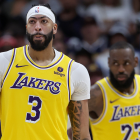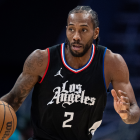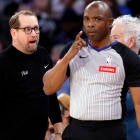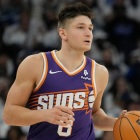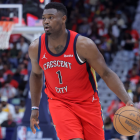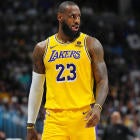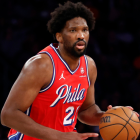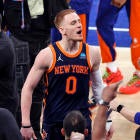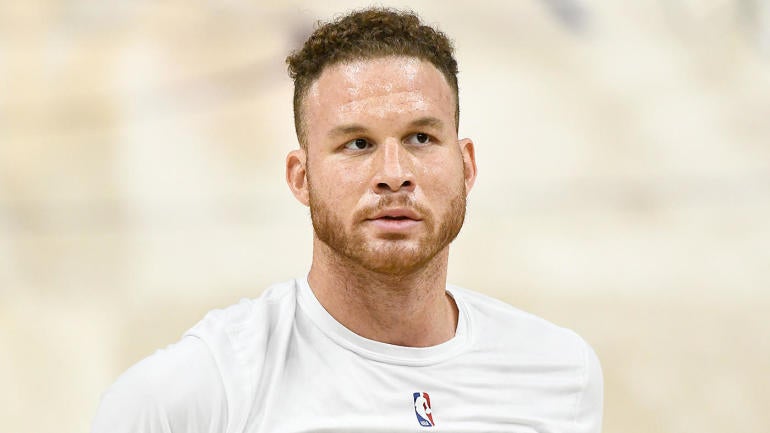
Blake Griffin himself is proof that no NBA player is untradeable. In 2018, with more than four years remaining on a contract worth a whopping $171 million when signed in July 2017, he was not only dealt to the Detroit Pistons, but managed to net the Los Angeles Clippers quite a bit of value. Griffin was younger then, but his injury history just as pronounced. Teams are willing to take chances on rare enough talents.
But at this stage of his career, few teams are likely to take such a chance on Griffin. At 31 years old, he is averaging a career-low 12.3 points on 36.5 percent shooting. He has not dunked this season, nor has he defended at a high or even average level. He is still a gifted passer, and he's grown into a willing if not particularly effective 3-point shooter, but the years have been unkind to the former All-Star. Never say never when it comes to blockbuster trades, but finding a taker for Griffin now will be difficult.
If he were simply a declining player, that would be one thing. But he is making $36.6 million this season and has a player option for nearly $39 million next season that he is almost certain to pick up. Even the few teams that could match his salary this season wouldn't be interested in paying Blake a year from now. The Pistons may want to move him, but finding an eager buyer won't be easy.
They'd likely have to attach assets, a move that makes little sense given how early they are in their rebuild. Detroit is pressed up against the 2021 cap, but are currently slated for over $50 million in 2022 cap space. Why give up anything of value just to fast-forward that space by a year when 2021 has a weak free-agent class? Detroit can afford to spend another year in the lottery before it splurges.
Keeping Griffin hardly makes sense either. A veteran of his stature shouldn't be plastered to the bench, but the young Pistons have several young forwards and bigs in need of minutes that Griffin had been occupying. That makes a buyout the simplest solution, but when? Multi-year buyouts are a rarity in the NBA, so getting anything done prior to the offseason would be unusual.
All of this is to say that Griffin's situation is fairly complex. This is not as simple as a veteran wanting to play for a winning team or a cellar dweller looking to unload a big contract. Getting Blake Griffin off the Pistons is going to be a massive undertaking, one whose outcome we can't properly predict at the moment. So let's go through the three possible ways Griffin could leave the Pistons before the expiration of his contract, and which teams might be interested in each scenario.
Scenario 1: Trades
Griffin's $36.6 million salary is nearly unmatchable for the majority of teams. League rules dictate that an acquiring team would need to send out 80 percent of that figure -- $29.3 million -- to make a deal work. Most teams simply don't have that kind of matching salary lying around. Before looking into whether any deals actually make sense, let's just do a quick audit of which teams might actually be able to make such a deal.
- Washington (Russell Westbrook) and Houston (John Wall) both have players that are even more expensive and have longer deals.
- Cleveland has Kevin Love, who makes slightly less but fits within that 80 percent window, but whose contract also extends beyond Griffin's. They also have Andre Drummond, who comes very close and whom they are actively trying to trade.
- Chicago has Otto Porter Jr., who has fallen off significantly and has a $28.5 million expiring deal. San Antonio has LaMarcus Aldridge in a similar situation.
- Memphis (Gorgui Dieng, Dillon Brooks, Justise Winslow), Orlando (Terrence Ross, Evan Fournier), Oklahoma City (Trevor Ariza, George Hill, Darius Miller), Dallas (Tim Hardaway Jr., Dwight Powell, James Johnson), Sacramento (Harrison Barnes, Cory Joseph) and New Orleans (Eric Bledsoe, JJ Redick) all have multiple mid-tier salaries that may or may not be considered essential to their futures, so if they needed to stack several to make a big trade, they hypothetically could. Others have this capability as well, but not quite as cleanly.
Now, do any of these teams make sense as suitors? Probably not. None of them are in absolute win-now mode, and you certainly wouldn't trade for Griffin as a future-based move. Why would Cleveland exchange one veteran headache for another? Why would the Pistons take on an extra year in salary for someone like Westbrook or Love? Most of the teams in that last category have power forwards in their core already. The Pelicans aren't going to play Griffin next to Zion Williamson.
If you really squint, maybe Chicago? The Bulls have found some success using Thaddeus Young as an offensive hub, and might like the idea of another bigger player who can pass. Lauri Markkanen is a restricted free agent this offseason. Griffin might sell a few jerseys if they decide to let him walk. The Bulls signed Dwyane Wade once upon a time. Griffin wouldn't be entirely dissimilar, but in reality, taking on $40 million in 2022 salary just doesn't make sense for a young Bulls team. If that's the best offer on the board, a deal probably isn't happening. It would take a surprise team acting egregiously against its own self interest to take on Griffin's money for next season.
Scenario 2: In-season buyout
Multi-season buyouts are rare, but they happen. DeMarre Carroll got one last season. Deron Williams got one several years ago. When a player is desperate enough to escape a losing situation, they are more willing to sacrifice financially to do so. Maybe Griffin is, but it doesn't seem overly likely. This is almost certainly the final big contract of his career. One of the primary drivers of buyouts is a desire to find situations in which players can better showcase themselves to future employers, but someone in Blake's situation might not have a chance to make up whatever he sacrifices. That is why buyouts are more common on expiring deals. There's less money left on the deal to haggle over.
But let's say Griffin were to leave enough money on the table to escape Detroit this season. Where might he land? Brooklyn stands out as the obvious destination given its need for size and financial flexibility. The Nets have both their taxpayer mid-level exception and a $5.7 million disabled player exception to wield on the buyout market while most teams have only the minimum to work with. If Griffin believed he could get that much from Brooklyn, it might motivate him to sacrifice more money from Detroit.
The issue is Brooklyn's defense is struggling as it is. Adding an immobile big man wouldn't help matters. Blake's former coach in Philadelphia, Doc Rivers, has a bit more defensive flexibility with Joel Embiid and Ben Simmons in place. Daryl Morey has never been shy about adding former stars. If he signed Carmelo Anthony for the minimum, he might be intrigued by Griffin for the same reasons, though the fit might be a bit uncomfortable. Dwight Howard, a non-shooter, plays the bulk of the minutes that Embiid doesn't. He and Blake aren't exactly an ideal fit.
And then there are the precariously thin contenders. Bobby Portis has thrived in Milwaukee, but he's the only big Bucks backup who appears viable in a postseason setting. Portland is down to one healthy big man in Enes Kanter. Miami is always on the lookout for star power, even if it's faded. Griffin would find a contender relatively easily if he hit the open market in March. Even in his present state, he's far better than the players that usually become available after the deadline.
Scenario 3: Offseason buyout
Logistically, this is the likeliest scenario. If there are teams willing to pay Griffin above the minimum, he could line up a deal with a new team and then surrender the exact price tag of that new contract in the buyout. In the likelier scenario that he's a minimum-salary player moving forward, he'd still at least have made every penny owed to him for the 2020-21 season. He'll get a hefty portion of his 2021-22 money as well. Detroit wants him gone as badly as he likely wants to win. There is a mutually beneficial arrangement to be made here.
The offseason is when the two most interesting possible Griffin destinations become feasible. The first is the obvious reunion. The Clippers are pressed against the hard cap and unlikely to make any mid-season moves given that lack of flexibility, but considering the money they already have committed for next season, they probably aren't going to be able to use the mechanisms that would actually trigger another hard cap for 2021-22 (the non-taxpayer mid-level exception, bi-annual exception or a sign-and-trade). They are already somewhat lacking in size, and that problem could get worse if Serge Ibaka opts out and walks for a bigger deal elsewhere.
This is the sentimental choice. The Clippers told Griffin that they wanted him to retire in Los Angeles when he was a free agent in 2017. They could potentially repair their relationship with him through an offseason buyout and make that dream a reality. Of course, the Clippers aren't the only team in Los Angeles. If Griffin isn't ready to make up with his former organization, the Lakers actually make a fair bit of sense as well.
Like the Clippers, they are currently hard-capped but unlikely to face that restriction next season. They don't currently have any available minutes for Griffin, but that is probably going to change. Just as Ibaka has a player option, so, too, does Montrezl Harrell. The difference is that Ibaka has already played out multiple expensive contracts. Harrell hasn't gotten his long-term payday yet. The Lakers would love to give it to him, but as he will only have Non-Bird rights, their offer will be limited to only a 20 percent raise on his 2020-21 salary, which was already discounted to fit within the mid-level exception. In other words, Harrell is probably going to get an offer elsewhere that the Lakers can't match, leaving them in need of some bench scoring from a big man.
Enter Griffin. The Lakers had a wonderful experience rehabilitating Howard's image last season. Griffin could be a similar low-risk, high-reward addition. He'd get to return to Los Angeles, compete for a championship and stick it to his former team in one fell swoop. Griffin's priorities aren't clear yet, but that's a tempting combination of opportunities.
















